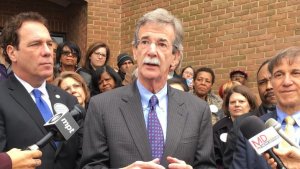The Baltimore Sun, by Pamela Wood
February 15, 2017
Healthcare advocates who are pushing for bills to combat rising prescription drug prices in Maryland drew sympathy but also skepticism from state lawmakers Wednesday.
The General Assembly is considering a pair of bills. One would require drug companies to give notice of and explain significant price hikes. The other would authorize the attorney general to sue makers of generic drugs who engage in price gouging.
“We want drug manufacturers to make profits. We want them to produce generic drugs,” Attorney General Brian Frosh told the Senate Finance Committee. “But when they acquire and abuse monopoly powers, they hurt patients, they threaten our health care system and they damage our communities.”
Frosh was joined by Baltimore Health Commissioner Dr. Leana Wen, Baltimore County Executive Kevin Kamenetz, Prince George’s County Executive Rushern Baker and representatives from Maryland Health Care for All, churches, the NAACP and the state medical society. Several told stories about people they know who have struggled to pay high drug prices.
Baker, whose wife has Alzheimer’s disease, said he once had to pay for one of her prescriptions out of pocket, even though he has a generous insurance plan through the county. The drug, Namenda, used to cost $150 for a one-month supply. It cost Baker $350, he said.
Bonnita Spikes said she has early-onset Alzheimer’s disease. The Prince George’s County woman said she’s struggled to pay for drugs since her illness forced her to stop working.
“It’s so expensive, I can’t afford it,” she said.
Others spoke of price hikes for prescriptions such as the heroin overdose drug naloxone. The price of the injectable version has increased 500 percent over the past two years. The nasal spray has gone up 63 percent.
EpiPens, which are used to treat allergic reactions, have increased by several hundred dollars in recent years.
Franchot says without tax fraud bill ‘state is going to continue to get ripped off’
Some invoked the drug executive Martin Shkreli, whose company raised the price of the anti-parasite drug Daraprim by 5,000 percent.
But representatives from drug and technology companies said they aren’t necessarily to blame for high prices. And they argued that the reporting requirements in the drug price bill would add an expensive burden — driving up the costs of developing drugs and potentially forcing companies to leave Maryland.
“The proposed transparency requirements … would present new barriers to success for the majority of Maryland’s bioscience companies,” Martin Rosendale, a biotechnology entrepreneur who is biosciences director for the Maryland Technology Council, told lawmakers.
Some committee members were skeptical that the proposed legislation would do anything to contain price increases.
“I don’t know that this fixes that one bad actor,” Sen. Stephen Hershey said.
The Eastern Shore Republican noted that “multiple players” — the drug maker, insurance companies and pharmacy benefit managers, for example — affect the final price of a drug.
The drug and tech representatives suggested that patients might now be better attuned to the price of drugs because insurance companies have changed their plans. Insurance companies now require patients to pay more of their drug costs out of pocket before the coverage kicks in.
“It’s what happens all the way down the drug supply chain,” said Kristin Parde, a deputy vice president of the Pharmaceutical Research and Manufacturers of America.
Some lawmakers said they feel pressure to help their constituents, who are frustrated by high prices.
If the proposed legislation won’t help, Sen. Katherine A. Klausmeier said, lawmakers need guidance on what changes they could make that would contain drug price hikes.
“Prescriptions are just out of sight,” the Baltimore County Democrat said. “We hear it all the time.”
Sen. Joanne Benson said costs are “off the hook.”
“We’ve got to do something about this,” the Prince George’s Democrat said. “We must find a way to lower the price of prescriptive medicine.”
Finance Committee Chairman Thomas “Mac” Middleton said a subcommittee will look more closely at the bills.
A House of Delegates committee is scheduled to hear testimony next week.
pwood@baltsun.com
twitter.com/pwoodreporter
Last modified: February 16, 2017



